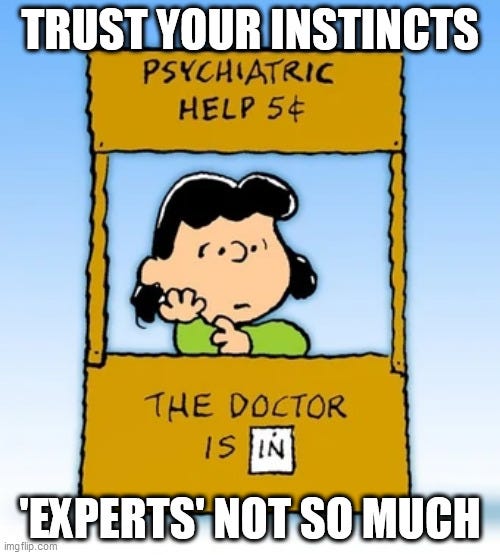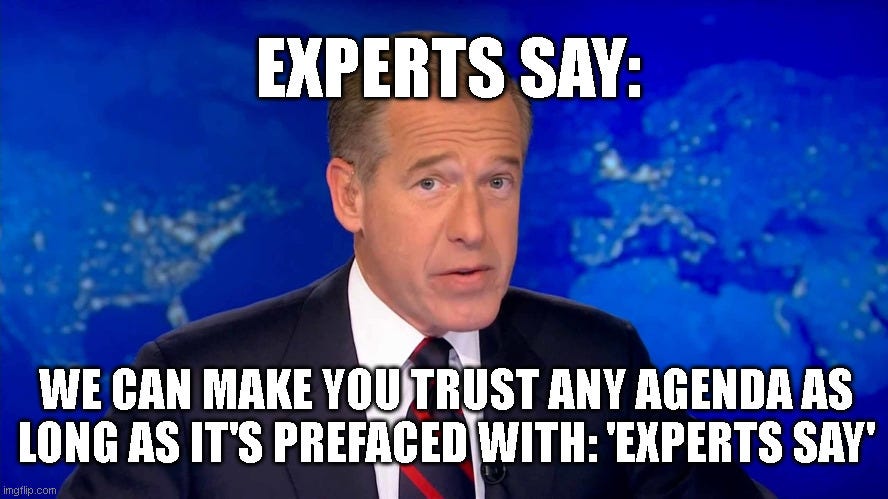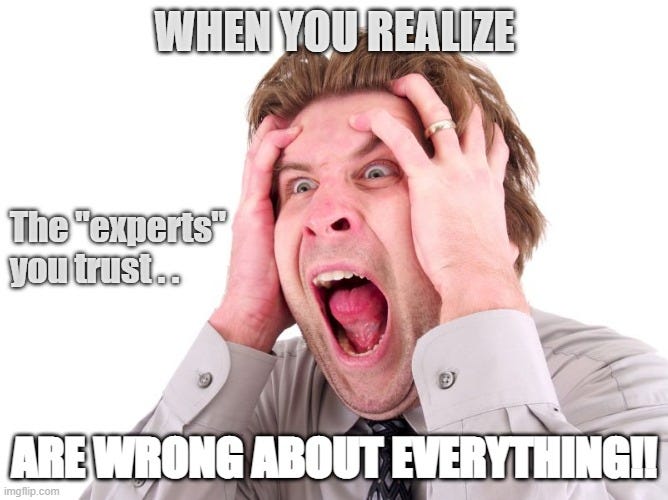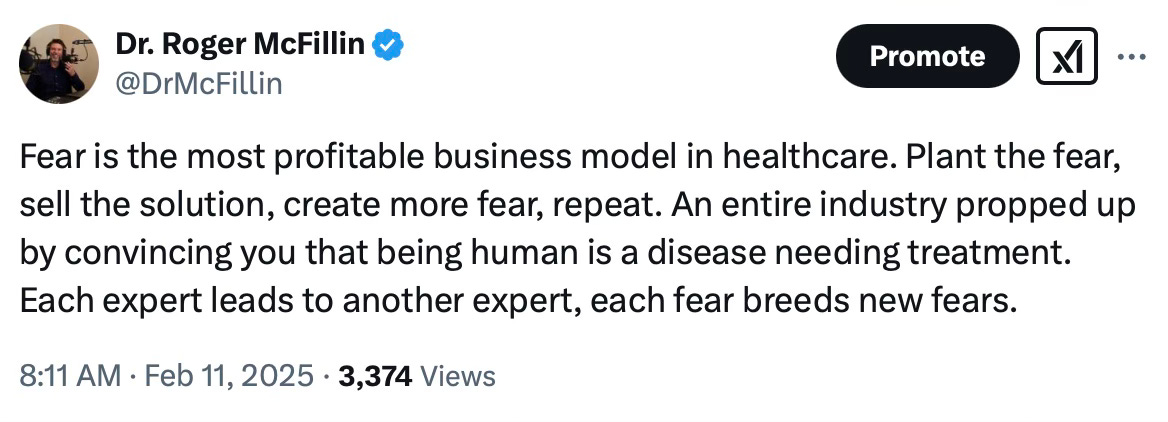Professional Help Is Making Us Helpless
How fear-based healthcare is drowning out our inner wisdom
It was Super Bowl Sunday, and like millions of Americans, I settled in to watch what was promised to be an epic battle between the Chiefs and Eagles. But between the plays, a different battle unfurled on my screen – an endless parade of pharmaceutical commercials, each one painting a picture of lurking diseases and hidden health threats.
"Ask your doctor about..." echoed through my living room every few minutes, accompanied by rapid-fire lists of side effects and warnings. The rapid-fire list of side effects – everything from headaches to death – delivered in soothing voices over images of people living their best lives, as if being terrified of your own body was the path to happiness.
As I watched these carefully crafted messages of fear, I couldn't help but notice how they all pointed to the same solution: trust the experts, take this pill, get another screening. The game's excitement was repeatedly interrupted by reminders that we might be sick without knowing it, that our bodies are ticking time bombs requiring constant surveillance by medical professionals. This bombardment of fear-based messaging isn't unique to Super Bowl Sunday – it's the soundtrack of American life, a constant drumbeat telling us to distrust our bodies and surrender our inner knowing to external authorities.
I love football, but these days I find myself reaching for the mute button during commercials. Not because I mind the endless beer ads or insurance mascots, but because I can't stomach watching another masterclass in fear manipulation. Every break in the action delivers a new message of medical terror: silent diseases lurking in your body, mysterious symptoms you didn't know to fear, rare conditions you never knew existed but suddenly need to "ask your doctor about."
Eight million dollars for thirty seconds – that's what these pharmaceutical companies paid to transform healthy people into anxious patients, constantly scanning their bodies for signs of trouble. Their message is as sophisticated as it is sinister: your body is an enigma only experts can decode, your health a ticking time bomb only they can defuse.
Watching these ads, I couldn't help but think of “Sarah”, who sat in my office last week, a perfect case study in how this culture of fear and expertise has invaded every aspect of our lives.
Sarah sat in my office, her four-week-old daughter finally asleep in her car seat, and burst into tears. "I'm failing at everything," she whispered, pulling out her phone to show me a collection of apps tracking her baby's every breath, move, and feeding.
"If I don't get her to gain weight faster, her brain development could be affected. If I can't increase my milk supply, I'll have to supplement with formula, and then my milk will probably dry up completely. Every time she makes that clicking sound while nursing, I panic – what if her poor sucking pattern means she'll have speech problems later? What if she's not getting enough hindmilk? What if all this stress is passing through my milk and affecting her development?"
The parade of experts had begun even before she left the hospital. The first lactation consultant noticed a "slight" tongue tie and recommended a specialist. That specialist suggested an occupational therapist who specialized in infant oral motor skills. The occupational therapist identified "inadequate sucking patterns" and prescribed a series of mouth exercises, warning that improper sucking could affect everything from feeding to speech development. Meanwhile, the baby wasn't gaining weight fast enough according to one growth chart (though was perfect on another), so a second lactation consultant prescribed a rigorous feeding and pumping schedule that made military boot camp look relaxed.
"I can't sleep because I'm terrified of doing everything wrong," Sarah confessed, her voice trembling. "The sleep specialist gave me a 47-page PDF about 'sleep hygiene' for newborns. She says I have to watch for precise wake windows – not too long or she'll be overtired and her cortisol will spike, not too short or her sleep pressure won't be high enough. I have to put her down drowsy but awake, but not too drowsy or I'm creating a sleep crutch, but not too awake or she'll get overtired. And if she cries, I have to wait four minutes, then check for exactly two minutes, then wait six minutes..." She pulled out her phone to show me the sleep tracking app, filled with red flags indicating "suboptimal" sleep transitions.
"At my last pediatrician visit," Sarah continued, wiping her eyes, "I made the mistake of mentioning that I cry sometimes when I can't get her to sleep. The doctor immediately pulled out a depression screening questionnaire. Yes, I told her, I worry a lot. Yes, I have trouble sleeping. Yes, I feel overwhelmed. I'm a new mother trying to follow impossible protocols from five different experts – who wouldn't feel this way?"
She let out a bitter laugh. "But now she's worried I have postpartum depression. She says my anxiety could affect the baby's brain development, that my stress hormones could pass through my breast milk, that if I don't treat it now, I might not bond properly with my baby. She handed me a prescription for an SSRI before I could even finish explaining that I'm crying because I'm drowning in expert advice telling me everything I'm doing is wrong. The irony is, being told that my normal feelings of overwhelm could permanently damage my baby is what's actually making me depressed. It's like being diagnosed with anxiety disorder because you're having a normal reaction to being chased by a bear."
Looking at Sarah now, drowning in expert advice and paralyzed by fear, I couldn't help but see her struggle as just the beginning. This expert-driven anxiety doesn't end with infancy – it follows parents through every stage of their child's life, growing more complex with each passing year. By preschool, parents are frantically googling whether their discipline style is too permissive or too authoritarian. They bounce between the latest parenting philosophies like lost souls seeking salvation: attachment parenting, gentle parenting, conscious parenting, structured parenting, positive discipline, free-range parenting – each promising to be the key to raising emotionally healthy children, each warning of the psychological damage that could result from choosing the wrong approach.
As I listened to Sarah, my mind drifted back 23 years to when my oldest daughter was born. I had to smile at the stark contrast – not because things were easier then, but because we existed in a blissful time before parenting became a pathology. No lactation expert hovered over our shoulders diagnosing "insufficient tongue elevation" during feeds. No sleep specialist prophesied lifelong trauma from the mortal sin of putting our baby down at the wrong drowsiness level. No occupational therapist analyzed our infant's sucking patterns as if decoding signs of impending developmental apocalypse.
Back then, postpartum depression was still considered what it truly is – a serious but rare condition – not a label slapped on every new mother struggling with the perfectly normal challenges of sleep deprivation, hormonal hurricanes, and first-time parent uncertainty. We weren't better parents; we were just allowed to be imperfect ones.
Somehow, in our primitive early-2000s existence, we were forced to do the unthinkable: figure it out as we went along. Sleep problems weren't pathologized – they were just called "having a baby." When our daughter woke up every two hours, we didn't consult a sleep expert's 47-page PDF about wake windows and sleep pressure; we just assumed babies weren't particularly fond of sleeping through the night.
Revolutionary concept, I know.
No app tracked our baby's every movement, no expert warned us about the perils of missing early hunger cues, and remarkably, no one suggested that our normal new-parent anxiety was rewiring our baby's neural pathways. Instead of timing our daughter's feeds with military precision, we just fed her when she seemed hungry. Instead of analyzing her sleep patterns for signs of future psychological damage, we just... helped her sleep however worked best on any given day.
In retrospect, our ignorance was our superpower. Without the chorus of experts planting fears in our consciousness, those fears simply didn't exist. No one told us we were creating "negative sleep associations" or "compromising our attachment" or "disrupting our baby's circadian rhythms." We were just parents, doing our best to understand our baby's needs, approaching each day with flexibility and a healthy dose of common sense.
The irony hits me square in the face every time a parent frantically scribbles notes during our sessions: I've become another expert in their endless parade of experts. They arrive clutching their phones full of parenting apps, ready to add my voice to their chorus of consultants, hoping I'll give them the definitive 10-step guide to trusting their intuition (now available as a downloadable PDF!).
But here's the plot twist – my "expertise" is simply helping them see how this desperate search for expertise is the very thing drowning out their inner wisdom. It's like being a GPS system whose only function is to tell you to stop using GPS and trust your own sense of direction.
But when parents finally grasp what's happening – when they see how this constant outsourcing of their parental instincts to experts has become the source of their anxiety rather than its solution – something shifts. They begin to recognize that every expert they've consulted about their child's sleep, feeding, or behavior has inadvertently planted a seed of doubt about their own capacity to parent. Each professional opinion, while well-intentioned, has added another layer of noise drowning out their heart's natural intelligence. My job isn't to add to that noise, but to help them find the mute button.
I see parents of teenagers in my office, paralyzed with fear about their child's mental health, questioning every mood swing and teenage rebellion as a potential sign of deeper pathology. They've lost permission to trust their instincts, to respond authentically to their children without first consulting an expert, reading a book, or joining a Facebook support group. Every parental reaction must be filtered through the lens of potential psychological impact: Will setting this boundary trigger abandonment issues? Will refusing this request damage our attachment? Will expressing frustration traumatize my child?
The mental health industry has become complicit in this fear cascade. Normal childhood emotions are pathologized, typical developmental stages are treated as potential disorders, and parents are made to feel that without expert intervention, they're just one wrong move away from damaging their child's psyche forever. We've created a culture where parents no longer believe they can naturally attune to their children's needs – instead, they must defer to experts for every interaction, every decision, every emotional response.
The cruel irony is that this constant hypervigilance, this endless second-guessing and expert consultation, is creating the very anxiety and disconnection it claims to prevent. In our desperate attempt to protect our children's mental health, we've created a generation of parents too afraid to trust their own hearts, too paralyzed by fear to access their natural intuitive wisdom. And their children, in turn, learn not to trust their own inner knowing, perpetuating this cycle of fear and dependence on external expertise.
The true epidemic isn't whatever condition they're selling medications for in their latest commercial – it's our growing disconnection from our own heart intelligence. This isn't just metaphorical wisdom – it's documented science.
Research has shown that the heart possesses its own complex nervous system, often called a "heart brain," that communicates directly with our cranial brain through neural, hormonal, and electromagnetic pathways. This heart-brain connection is so sophisticated that studies have demonstrated the heart often receives and processes information about our environment before our brain does.
When we're constantly scanning for problems, living in fear of what might go wrong, we create what researchers call "incoherent" heart rhythms – chaotic patterns that actually inhibit our ability to think clearly and access our intuitive intelligence. This isn't just "stress" – it's a measurable disruption of the very system designed to help us navigate life with wisdom and clarity.
Your heart, when you actually listen to it, communicates through a language more sophisticated than diagnostic codes or statistical probabilities. It creates coherent rhythmic patterns that synchronize our entire body's systems, allowing us to access what researchers call "nonlocal intuition" – a type of knowing that transcends our normal limitations of time and space. While we're up in our heads cataloging everything that could go wrong, our hearts are literally sending signals trying to guide us back to our natural state of coherent function.
The next time an expert tries to plant a new fear in your mind, the next time a commercial suggests you might be harboring some undiagnosed condition, the next time a specialist recommends another specialist who recommends another specialist – pause. Feel your heart beating. This isn't just an organ pumping blood; it's a sophisticated information processing center that has been guiding human beings long before we had experts to tell us how to live.
The most radical act in today's fear-saturated world isn't finding more experts – it's restoring coherence to our heart's natural rhythms and trusting the intelligence that emerges from that state. It's choosing physiological coherence over panic, heart intelligence over endless expertise, embodied wisdom over worry. Because while fear might be profitable, it's actually destroying our access to the most sophisticated guidance system we possess.
RESIST









I realize this is not the point but I am sick thinking about someone trying to sleep train a newborn.
Yes. The crisis isn’t a lack of expert advice, but the loss of our own inner authority. When fear is commodified, intuition is pathologised, and uncertainty is treated as a disorder, we don’t just lose confidence, we lose the ability to think and act for ourselves.